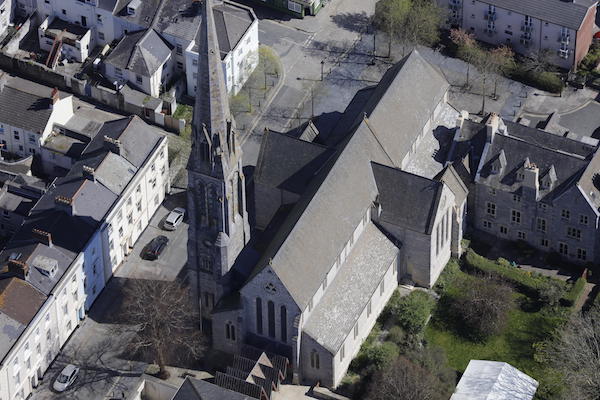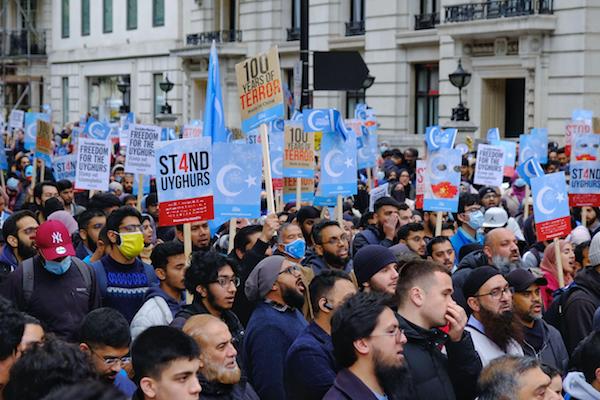Abdurahman Tohti's wife and two children have been lost to him since they left their new home in Istanbul in 2016 to return home to visit family. According to friends, she had been arrested at Urumqi airport and sentenced to ten years in prison. No one could tell him what had become of his two infant children. Suddenly, in May 2019, scrolling through TikTok he saw the familiar face of his son Abduleziz, now four years old, surrounded by other children, being fired with questions about himself and the “motherland” in Mandarin. He replied in perfect Chinese.
Abdurahman was devastated, but not alone. He is just one of many exiled parents whose children have been trapped in the largest assimilation project the world, sweeping up China's Uyghur and Tibetan children, stripping them of their language, their culture and their religion. Experts fear there will be nothing left within a generation.
According to Bill Clark, of Peace Catalyst International, addressing a specially convened Uyghur Human Rights Project (UHRP) webinar to coincide with the papal “pilgrimage of penance” to Canada, while America and Canada are urgently trying to right the wrongs of their devastating indigenous policies, Beijing has set its face like flint against Uyghurs, refusing to learn from the history it says the West itself should learn from.
Even as Pope Francis expresses "deep sorrow" and "humbly begs forgiveness" for Catholicism's "disastrous policies" in running boarding schools where children were wrenched not only from their parents, but also everything familiar to them, the copycat manoeuvres of the Chinese Communist Party (CCP) have inflicted on Uyghur and Tibetan children the very privations and cruelties it denounces.
Uyghur scholar Adrian Zenz, who has been key to exposing the origins and extent of human rights atrocities against the Turkic peoples in Xinjiang, has lately observed a stepping up of state boarding school provision to include children as young as four or five. The purpose, he told the webinar, is to keep a tight rein on “difficult ethnic groups” such as Tibetans and Uyghurs, whose different language, spirituality and culture are stumbling blocks for integration with the majority Han Chinese population.
Landon Tethong, director of the Tibet Action Institute, fears the CCP is bent on an “elimination project”. Despite an almost total information blackout in her homeland, her organisation has estimated 900,000 Tibetan children are currently undergoing immersion in Mandarin residential boarding school education, including four- and five-year-olds who only see their parents at weekends. After the first grade, children might not see their parents more than once every three months.
Forbidden to speak their own language, practise their religion or learn about their culture, children very soon become unable to communicate with grandparents, the guardians of the oral tradition. Parents are often moved out of their own localities as “surplus labour” to work in other provinces, causing a further breakdown of the family unit and indigenous customs.
Significantly, according to Zenz, the acceleration of compulsory boarding schooling for Uyghurs coincided with mass arrests and extra-judicial internments in Xinjiang.
Initial plans for 80 per cent of children to be in pre-school by 2020 were ratcheted up in 2017 with orders, once the round ups started, to scoop up 100 per cent of children by the autumn of that year. A whirlwind building programme in the Uyghur heartland of Kashgar saw the five-year school building programme swell from a planned 490 schools by 2020, to 1152 by 2017. From half a million children in first to ninth grade in boarding schools in 2017, numbers had increased by 2019 to 880,000.
Construction was to be carried out in “military command fashion” according to government documents, with the haste of “spurring a horse to full speed with a whip”, he found.
More ominously, in the light of the numbers of children being orphaned by the internment drive, Zenz unearthed state records referring to the “special needs” of the children of detainees and those “in training”, a euphemism for so-called “re-education” camps. The government admitted that abandoned children in “difficult family circumstances” would need “psychological counselling”, “special attention, monitoring and surveillance”. These children would need to be compensated for the “lack of family ties” and the potential “negative impact” of their family breakup on their personality development.
But overall, the government notices claimed, separation from their families was now benefitting the children in developing “better life habits”. Their hygiene had improved and they were developing “more open and polite personalities”. Effects of “extremist thought” handed down from their parents were subsiding, and their views on non-Muslim groups, education and modern medical care had improved. This was described as “strengthening their thought education” and “inoculating them against extremist thinking”.
Teachers or staff who demurred with the CCP policy, or continued advocating their mother tongue, were branded “double-faced” and dealt with sternly. Failure to report such incidents was severely punished.
The Chinese state had become the “better parent”. Raising, educating and civilising the next generation was now being carried out by the state. Parents, according to Zenz's research, were becoming redundant. They could be moved around the country for work on a whim and need no longer be “tied” to their families and the raising of children.
But according to Bill Clark, whose organisation has been involved in counselling Uyghurs who have experienced multi-faceted distress associated with events in the homeland, children cannot be wrenched from their roots without significant and permanent harm. Testimonies from North America's indigenous people, forced from their families and corralled into boarding schools, tell of humiliation, degradation, and emotional scarring that affect them to this day. These historic crimes cause lifelong and generational trauma, he said.
When China's foreign ministry spokesperson Zhao Lijian admonished the USA for its indigenous policies during a press conference in May this year, he urged the country to “adopt serious measures to truly help ethnic minorities get over their trauma”. “More importantly,” he said, “the US should learn from history, treat the social endemic of racism, and avoid repeating the human rights tragedies time and again.”
Clark spoke of the “dark chapter” in both North American countries and the conclusion of the Canadian Truth and Reconciliation Commission, after testimonies from hundreds of survivors, that the Canadian government had committed cultural genocide against its own indigenous peoples.
On 11 May this year, the US Department of the Interior released its long-awaited report on US federal boarding schools. “The details were devastating,” he said, citing the dispossession of Indian lands and the forced assimilation of Native American peoples as the two primary policy goals. Residential boarding schools had been the vehicle whereby Indian children were to imbibe white cultural norms. “The assimilation process was both violent and traumatic,” he concluded, and asked: “Can we see a parallel situation in Tibet and Xinjiang?”
“Two generations from now, will a Chinese political leader apologise for their assimilation policies?” he asked, but sombrely concluded: “That will be too late.”
Beijing was well aware of “the dismal track record” of US and Canadian boarding schools, he noted, but blind to its own, and it was up to the democratic world to flag up the trauma inflicted on hundreds of thousands of children caught up in the CCP's drive to achieve its economic and social goals. “From internal state documents, these officials know these schools will create traumatic experiences for students and their families,” he concluded.
Quoting Martin Luther King Jnr’s words – “The arc of the moral universe is long, but it bends towards justice” – Clark hoped the “free world” would shake off its indifference and wake up to the plight of China's indigenous children and their parents.
“We are here on behalf of kids and their parents to cry out for justice and healing, and a bending of the arc, because we're not seeing it yet,” he said. “Let’s not waste this moment in time for the Tibetans and the Uyghurs.”



 Loading ...
Loading ...
What do you think?
You can post as a subscriber user ...
User comments (0)